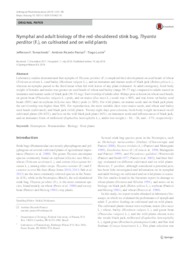Nymphal and adult biology of the red-shouldered stink bug, Thyanta perditor (F.), on cultivated and on wild plants.
Nymphal and adult biology of the red-shouldered stink bug, Thyanta perditor (F.), on cultivated and on wild plants.
Author(s): TOMACHESKI, J. F.; PANIZZI, A. R.; LUCINI, T.
Summary: Laboratory studies demonstrated that nymphs of Thyanta perditor (F.) completed their development on seed heads of wheat (Triticum aestivum L.) and barley (Hordeum vulgare L.), and on immature and mature seeds of black jack (Bidens pilosa L.), whereas no nymphs passed to the third instar when fed with leaves of any plant evaluated. At adult emergency, fresh body weight of females and males was greater on seed heads of wheat and barley (range 59–77 mg) compared to adults reared on immature and mature seeds of black jack (36–51 mg). Survivorship of adults after 40days post eclosion on wheat seed heads, on green bean (Phaseolus vulgaris L.) pods, and on maize (Zea mays L.) seeds was >80%, and was lower on barley seed heads (50%) and on soybean (Glycine max Merr.) pods (<20%). For wild plants, on mature seeds and on black jack plant, the survivorship was higher than 50%. For reproduction, the most suitable diets were maize seeds, and wheat and barley seed heads (cultivated), and black jack (wild) plants. Twenty-eight days post eclosion, fresh body weight increased on all cultivated plants (26–62%), and less on the wild black jack plant (16%); on immature seeds and inflorescences of black jack, and on immature fruits of milkweed (Euphorbia heterophylla L.), adults lost weight (?10, ?26, and ?17%, respectively). Keywords Heteroptera · Pentatomidae · Biology · Host plants
Publication year: 2019
Types of publication: Journal article
Unit: Embrapa Wheat
Keywords: Heteroptera, Thyanta Perditor
Observation
Some of Embrapa's publications are published as ePub files. To read them, use or download one of the following free software options to your computer or mobile device. Android: Google Play Books; IOS: iBooks; Windows and Linux: Calibre.
Access other publications
Access the Agricultural Research Database (BDPA) to consult Embrapa's full library collection and records.
Visit Embrapa Bookstore to purchase books and other publications sold by Embrapa.

